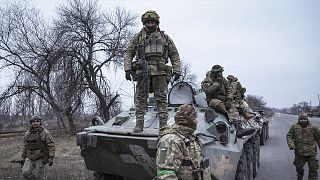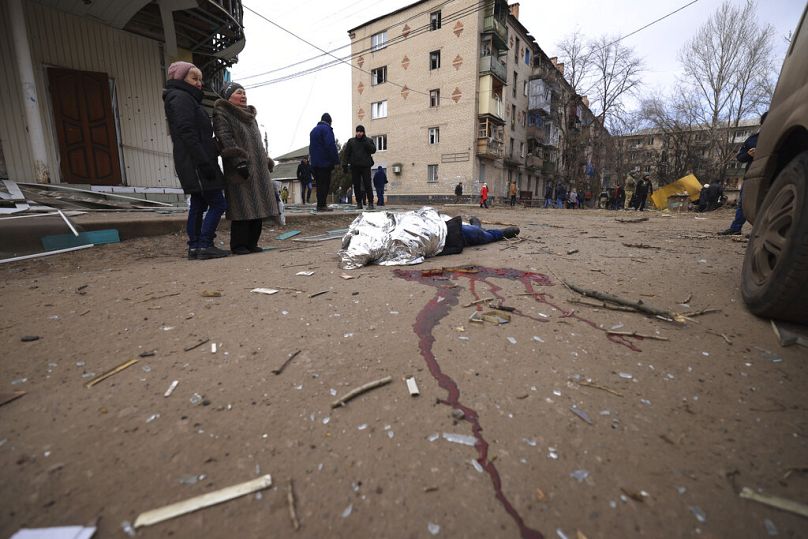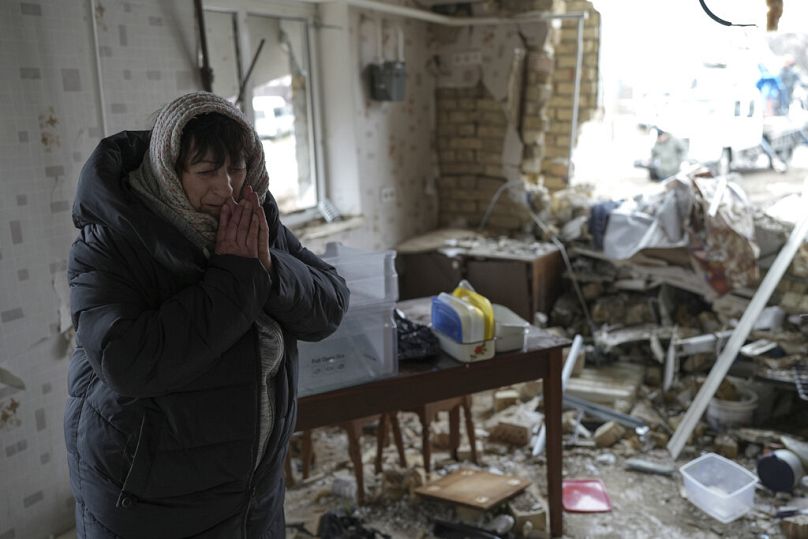Ukraine war: Heavy fighting in Donetsk continues and four other top developments
1. Ukraine army says Blahodatne still standing, Wagner claims otherwise
Ukraine’s military said on Sunday its forces repelled an attack in the area of Blahodatne in the eastern part of the Donetsk region. In contrast, Russia’s Wagner private military group said it took control of the village.
Ukrainian soldiers stand atop on APC before going to the frontline in Donetsk region, 28 January 2023 –
Copyright AP Photo/Andriy Dubchak
“Units of Ukraine’s Defence Forces repelled the attacks of the occupiers in the areas of … Blahodatne … in the Donetsk region,” the General Staff of Ukraine’s Armed Forces said in its daily morning report, referring to fighting on Saturday.
It added that its forces repelled Russian attacks in the areas of 13 other settlements in the Donetsk region.
The Wagner Group, designated by the US as a transnational criminal organisation, said on the Telegram messaging app on Saturday that its units had taken control of Blahodatne.
Reuters was not able to independently verify the reports
With fighting heating up in the Donetsk region, the exact line of contact has been unclear, especially around the town of Bakhmut, where some of the heaviest fighting of the war has been taking place in recent weeks. The Wagner Group has made premature success claims before.
Ukraine has said that the Russian offensive on Bakhmut has not culminated, but the situation along the front line there has been growingly difficult. President Volodymyr Zelenskiy said on Friday that it was acute.
2. Russian strikes kill four in Donetsk bombardment, authorities say
A Russian strike killed three people in a residential district of the eastern Ukrainian city of Kostiantynivka on Saturday, the regional governor said.
Fourteen other people were wounded in the attack, which also damaged four apartment buildings and a hotel, Pavlo Kyrylenko said.
“Rescuers and law enforcement officials are working at the scene of the tragedy to help people and carefully document yet another crime by the Russian occupiers on our land,” he wrote on Telegram.
Kyrylenko said at least four people had been killed and seventeen wounded throughout the region from Russian strikes over the past 24 hours. The fourth victim was killed in Bakhmut.
Twisted metal and the charred remains of household items and at least one car lay scattered across the courtyard in Kostiantynivka as rescuers worked to clear the rubble. Fresh bloodstains were also visible.
Factory worker Iryna Maltseva, 42, said she was watching television when the explosion violently rattled her living room.
“I opened my eyes and everything was blown out,” she said. “I was covered in blood. Mom was sitting in the bedroom, also covered in blood.”
President Volodymyr Zelenskyy said on Friday the situation at the front remained “extremely acute”, particularly in the Donetsk region, where Russia is stepping up an offensive.
Moscow invaded Ukraine last February, but in recent weeks, fighting has slowed to an attritional battle, with neither side making significant gains.
Kyiv has repeatedly warned that Russian forces would attempt to mount another offensive sometime in the coming weeks or months.
Meanwhile, Moscow accused the Ukrainian army of killing 14 people and wounding 24 others when it allegedly struck a hospital in the Russian-controlled part of the Luhansk region in the Donbas.
In a statement on Saturday, the Russian military accused the Ukrainian forces of “intentionally striking the local hospital building with HIMARS rocket launchers” in the Novoaydar locality of the Lugansk region.
Euronews could not independently confirm Moscow’s claims.
3. EU official says Russia has transitioned the war to conflict ‘against NATO and the West’
Moscow has ratcheted up its invasion of Ukraine by making indiscriminate attacks on civilians and framing the conflict as a struggle against the West, according to a senior EU official.
Stefano Sannino, Secretary General of the European Union’s European External Action Service, said on Friday Russia has taken the war to “a different stage” while defending Germany and the US’s decision to send tanks to Kyiv.
He criticised Russian President Vladimir Putin for waging war on NATO and the West, saying this had triggered this week’s move to supply Ukraine with heavy battle tanks.
Speaking at a news conference in Tokyo, Sannino said Putin had “moved from a concept of special operation to a concept now of a war against NATO and the West.”
The EU foreign policy official said German and US tanks are meant to help Ukrainians defend themselves rather than attack Moscow.
“I think that this latest development in terms of armed supply is just an evolution of the situation and of the way Russia started moving the war into a different stage,” Sannino said.
The EU is not moving the war into a different stage but is “just giving the possibility of saving lives and allowing the Ukrainians to defend [themselves] from these barbaric attacks,” he added.
Germany and the US announced on Wednesday they will send advanced battle tanks to Ukraine, offering what one expert called an “armoured punching force” to help Kyiv break a stalemate on the battlefield.
Washington will send 31 M1 Abrams tanks, while Berlin has agreed to give 14 Leopard 2 A6 tanks from its own stocks.
4. Wagner mercenaries shot for fleeing, says ex-commander
A former commander of Russia’s Wagner group, who fled to Norway, witnessed comrades being shot as they tried to flee the frontline in Ukraine, according to his Norwegian lawyer.
Andrei Medvedev, who escaped Russia over the Russian-Norwegian border in January, said he fears for his life after witnessing the killing and mistreatment of Russian prisoners taken to fight for Wagner in Ukraine.
Speaking to Euronews in January, experts made similar accusations that Chechen troops have been used to execute deserting Russian soldiers.
Medvedev is living in a secret location in the Oslo area after he was released from detention on Wednesday following a “disagreement” with police about measures taken to ensure his safety.
His lawyer Brynjulf Risnes said he had seen some “incredibly horrible” situations while fighting last autumn and was “slowly coming to terms with what’s happening” in Ukraine.
“His life has been chaotic and dangerous and very stressful for a very long time,” Risnes said, “particularly, of course, during the autumn when he was in Ukraine with the Wagner group.”
“But of course, his life hasn’t been easy before that either.”
Thousands of Ukrainian civilians have been killed, millions uprooted and cities reduced to rubble since Russian forces invaded Ukraine 11 months ago.
Kripos, Norway’s national criminal police service, which has responsibility for investigating war crimes, has begun questioning him about his experiences and wants to carry on, Risnes said.
Kripos is part of a project to investigate war crimes in Ukraine conducted by the International Criminal Court.
5. Ukraine grain harvest could nosedive in 2023, experts say
Ukrainian production of grain and other essential foodstuffs is expected to fall even further next year, according to new estimates.
Sown areas of grain and oilseed harvest are expected to drop to “53 million tonnes” in 2023, half of what they were in 2021, according to estimates by the Ukrainian Grain Association (UGA).
“We are at war,” said Nikolay Gorbachov, UGA President, on Thursday. “We continue to produce grain but the harvests will drop. For farmers, it is no longer profitable to produce grain.”
In 2021, 106 million tonnes of grain were harvested — a historic record. This fell to around 65 million tonnes for 2022, while “53 million tonnes” is predicted for 2023, he outlined.
Prior to the Russian invasion, Ukraine was the world’s fourth largest corn exporter, and the country was on the way to becoming the third largest wheat exporter.
Fighting in 2022 hampered the ability of farmers to sow crops, which was compounded by a lack of fuel and the destruction of agricultural machinery and storage infrastructure.
Gorbachov expressed concern about exports in the next season: “For Ukrainian national food security, it will be fine. But if Ukraine cannot export these 40 or 50 million [tonnes of grain]? Prices will increase. Europe can allow it, but not developing countries,” he said.
Disruptions to food exports from Ukraine have pushed many developing countries to the brink of starvation by sending prices into orbit.
Experts have warned the food crisis is causing increasing numbers of migrants to come to the EU.


